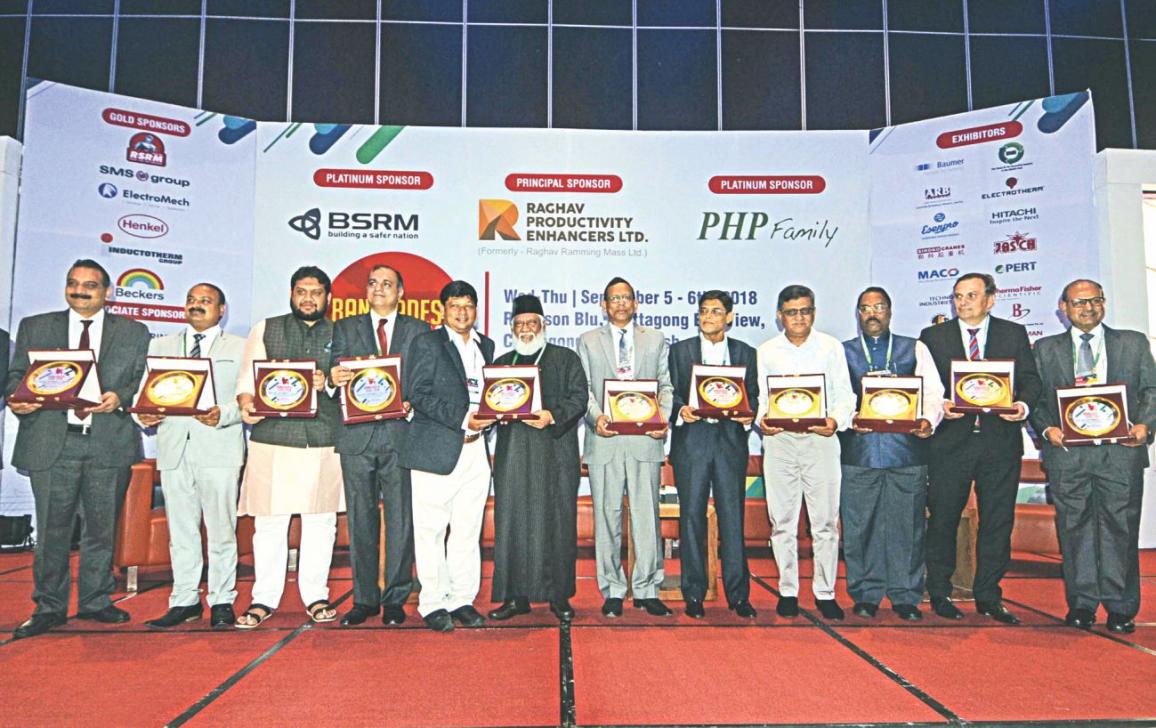Mega projects lift demand for steel

The rising demand for long and flat steel products is helping the steel sector expand fast thanks to the ongoing large infrastructure projects and construction of several economic zones, experts said yesterday.
They also underscored the need for the government's policy support to protect the local industry in the wake of a new global trend of gated globalisation.
Now, some countries are going for free trade agreements, eliminating tariff barriers among themselves while outsiders continue to facing higher tariffs. Economists call this gated globalisation. The experts spoke at the inaugural session of a two-day international conference on steel titled “Bangladesh Steel 2018”.
Steel Group, a global networking platform based in Mumbai, organised the event in association with Steel Users Federation of India.
The conference—the fourth such event to be held in the port city—is taking place at Radisson Blu Chittagong Bay View.
Over 250 delegates from 19 countries, including the USA, China, Japan, Germany, South Korea, Australia, Singapore, Italy, Belgium and India, are taking part in the event along with most of the major stakeholders of Bangladesh's steel industry.
Raghav Productivity Enhancers Ltd of India, BSRM and PHP Family are sponsoring the conference.
Per capita steel consumption in Bangladesh has grown to 45 kilogrammes (kg) last year from 25 kg in 2012, Sufi Mohammed Mizanur Rahman, chairman of PHP Family, said after inaugurating the event.
Per capita steel consumption is much higher in developed countries—400 kg in South Korea, 600 kg in the USA and 1,000 kg in Japan—compared to Bangladesh, he said. The amount of steel consumption is an important ingredient to understanding the economic growth of a country, Rahman said.
The consumption of seven million tonnes of steel every year has made Bangladesh a huge potential market for both long and flat steel products, he said.
“In Bangladesh, we still don't have a basic steel industry due to non-availability of iron ore or coal of our own; rather we are producing intermediate products by importing steel billets and CR [cold rolled] coil.”
He, however, hoped for bigger expansion in the sector if the proposed 100 economic zones could be developed and the required infrastructure development of Chittagong port could be done.
The country's per capita steel consumption is projected to increase to 73 kg by 2022, Aameir Alihussain, managing director of BSRM Group, said while delivering his keynote speech at the session.
The steel sector will grow further riding on Bangladesh's dense population, enhancing life expectancy rate, rapid construction of economic zones, large investments in infrastructures, booming agriculture, thriving garment sector and an increase in energy supply with the import of LNG, he said.
Businesses have to face difficulties in Bangladesh, as they have to roam around different government offices to complete the whole process of setting up an industry or operate an industry, he said. However, things are changing as bureaucracy is now becoming more business-friendly, but it needs to be improved a lot to facilitate business, he said.
Mentioning the new trend of gated globalisation, Alihussain said every country now wants to do trade, but only after protecting its own market.
“Particularly in the steel sector, China and some other countries have overcapacity. If we don't protect our industry we may have to see other countries go for dumping in Bangladesh.”
Many countries are now imposing taxes on imported products while the USA is promoting gated globalisation by securing its own interests, the BSRM chief said.
“Though our government is aware of that and they are ensuring required level of protection, but the government has to remain more alert so that the countries having overcapacity cannot dump their products here.”
China shared 49.2 percent of the world's total steel production of 1,689 million tonnes in 2017 while the part of China's steel use stood at 46.4 percent of the world's total use of 1,587 million tonnes, said Raghav Kabra, chief operating and innovation officer of Raghav Productivity Enhancers Ltd, India.
Ajay Tambe, CEO of Steel Group, and Md Salim Uddin, chairman of Bangladesh House Building Finance Corporation, also spoke.
